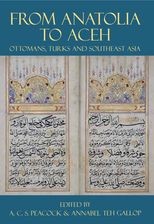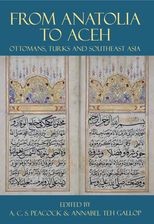From Anatolia to Aceh: Ottomans, Turks, and Southeast Asia
From Anatolia to Aceh: Ottomans, Turks, and Southeast Asia
Cite
Abstract
The papers collected in this volume investigate the relationship between Southeast Asia and the Ottoman Empire. Southeast Asia has long been connected by trade, religion and political links to the wider world across the Indian Ocean, and especially to the Middle East through the faith of Islam. However, little attention has been paid to the ties between Muslim Southeast Asia—encompassing the modern nations of Indonesia, Malaysia, Brunei, Singapore and the southern parts of Thailand and the Philippines—and the greatest Middle Eastern power, the Ottoman Empire. The first direct political contact took place in the sixteenth century, when Ottoman records confirm that gunners and gunsmiths were sent to Aceh in Sumatra to help fight against the Portuguese domination of the pepper trade. In the intervening centuries, the main conduit for contact was the annual hajj pilgrimage, and many Malay pilgrims from Southeast Asia spent long periods of study in the holy cities of Mecca and Medina, which were under Ottoman control from 1517 until the early twentieth century. During the period of European colonial expansion in the nineteenth century, once again Malay states turned to Istanbul for help. The chapters in this volume represent the first attempt to bring together research on all aspects of the relationship between the Ottoman world and Southeast Asia—political, economic, religious and intellectual—much of it based on documents newly discovered in archives in Istanbul. Individual chapters also trace the influence of Republican Turkey on Southeast Asian politics and culture.
-
Front Matter
-
1
Introduction Islam, Trade and Politics Across the Indian Ocean: Imagination and Reality
-
2
Rum and Jawa: The Vicissitudes of Documenting a Long-Distance Relationship
Anthony Reid
-
Part I The Political and Economic Relationship from the Sixteenth to the Nineteenth Century
-
3
From Istanbul with Love: Rumours, Conspiracies and Commercial Competition in Aceh–Ottoman Relations, 1550s to 1570s
Jorge Santos Alves
-
4
The Economic Relationship between the Ottoman Empire and Southeast Asia in the Seventeenth Century
A. C. S. Peacock
-
5
Hadhrami Mediators of Ottoman Influence in Southeast Asia
Jeyamalar Kathirithamby-Wells
-
6
The Ottoman Caliphate and Muslims of the Philippine Archipelago during the Early Modern Era
Isaac Donoso
-
3
From Istanbul with Love: Rumours, Conspiracies and Commercial Competition in Aceh–Ottoman Relations, 1550s to 1570s
-
Part II Interactions in the Colonial Era
-
7
The Ottomans and Southeast Asia Prior to the Hamidian Era: A Critique of Colonial Perceptions of Ottoman–Southeast Asian Interaction
İsmaİl Hakki Kadi
-
8
Acehnese Appeals for Ottoman Protection in the Late Nineteenth Century
İsmaİl Hakki Göksoy
-
9
Middle Eastern States and the Philippines under Early American Rule, 1898–1919
William G. Clarence-Smith
-
10
‘We Hope to Raise the Bendera Stambul’: British Forward Movement and the Caliphate on the Malay Peninsula
Amrita Malhi
-
11
Indonesian Readings of Turkish History, 1890s to 1940s
Chiara Formichi
-
7
The Ottomans and Southeast Asia Prior to the Hamidian Era: A Critique of Colonial Perceptions of Ottoman–Southeast Asian Interaction
-
Part III Cultural and Intellectual Influences
-
12
Representation of the Turkic–Turkish Theme in Traditional Malay Literature, with Special Reference to the Works of the Fourteenth to Mid-Seventeenth Centuries
Vladimir Braginsky
-
13
New Textual Evidence for Intellectual and Religious Connections between the Ottomans and Aceh
Oman Fathurahman
-
14
The Influence of Ottoman Qur’ans in Southeast Asia Through the Ages
Ali Akbar
-
12
Representation of the Turkic–Turkish Theme in Traditional Malay Literature, with Special Reference to the Works of the Fourteenth to Mid-Seventeenth Centuries
-
End Matter
Sign in
Personal account
- Sign in with email/username & password
- Get email alerts
- Save searches
- Purchase content
- Activate your purchase/trial code
Institutional access
-
Sign in through your institution
- Sign in with a library card Sign in with username/password Recommend to your librarian
Institutional account management
Sign in as administratorPurchase
Our books are available by subscription or purchase to libraries and institutions.
Purchasing information| Month: | Total Views: |
|---|---|
| October 2022 | 1 |
| October 2022 | 5 |
| November 2022 | 2 |
| November 2022 | 3 |
| December 2022 | 2 |
| December 2022 | 6 |
| December 2022 | 2 |
| January 2023 | 4 |
| January 2023 | 1 |
| January 2023 | 2 |
| January 2023 | 1 |
| January 2023 | 1 |
| February 2023 | 1 |
| February 2023 | 1 |
| February 2023 | 1 |
| February 2023 | 3 |
| February 2023 | 2 |
| February 2023 | 1 |
| February 2023 | 2 |
| February 2023 | 1 |
| February 2023 | 1 |
| February 2023 | 1 |
| March 2023 | 1 |
| March 2023 | 2 |
| March 2023 | 1 |
| April 2023 | 1 |
| April 2023 | 1 |
| May 2023 | 1 |
| May 2023 | 1 |
| May 2023 | 1 |
| May 2023 | 1 |
| May 2023 | 1 |
| May 2023 | 1 |
| May 2023 | 1 |
| May 2023 | 1 |
| May 2023 | 2 |
| June 2023 | 3 |
| June 2023 | 4 |
| June 2023 | 4 |
| June 2023 | 3 |
| June 2023 | 3 |
| June 2023 | 2 |
| June 2023 | 2 |
| June 2023 | 3 |
| June 2023 | 2 |
| June 2023 | 2 |
| June 2023 | 2 |
| June 2023 | 2 |
| June 2023 | 2 |
| June 2023 | 4 |
| June 2023 | 3 |
| July 2023 | 3 |
| August 2023 | 1 |
| August 2023 | 4 |
| August 2023 | 1 |
| August 2023 | 3 |
| August 2023 | 2 |
| August 2023 | 2 |
| August 2023 | 2 |
| August 2023 | 3 |
| September 2023 | 1 |
| September 2023 | 2 |
| September 2023 | 2 |
| October 2023 | 2 |
| October 2023 | 2 |
| October 2023 | 4 |
| October 2023 | 2 |
| October 2023 | 2 |
| October 2023 | 2 |
| October 2023 | 2 |
| October 2023 | 2 |
| October 2023 | 3 |
| October 2023 | 2 |
| October 2023 | 3 |
| October 2023 | 1 |
| October 2023 | 5 |
| October 2023 | 8 |
| October 2023 | 2 |
| October 2023 | 2 |
| November 2023 | 1 |
| November 2023 | 1 |
| November 2023 | 4 |
| December 2023 | 2 |
| December 2023 | 2 |
| January 2024 | 2 |
| January 2024 | 3 |
| January 2024 | 3 |
| January 2024 | 4 |
| January 2024 | 3 |
| January 2024 | 2 |
| January 2024 | 2 |
| January 2024 | 2 |
| January 2024 | 2 |
| January 2024 | 2 |
| January 2024 | 2 |
| January 2024 | 2 |
| January 2024 | 2 |
| January 2024 | 1 |
| January 2024 | 2 |
| January 2024 | 2 |
| January 2024 | 2 |
| January 2024 | 3 |
| January 2024 | 2 |
| January 2024 | 3 |
| January 2024 | 3 |
| February 2024 | 1 |
| February 2024 | 1 |
| March 2024 | 2 |
| March 2024 | 2 |
| March 2024 | 1 |
| March 2024 | 2 |
| March 2024 | 2 |
| March 2024 | 3 |
| March 2024 | 2 |
| April 2024 | 6 |
| April 2024 | 10 |
| April 2024 | 5 |
| April 2024 | 3 |
| April 2024 | 1 |




Get help with access
Institutional access
Access to content on Oxford Academic is often provided through institutional subscriptions and purchases. If you are a member of an institution with an active account, you may be able to access content in one of the following ways:
IP based access
Typically, access is provided across an institutional network to a range of IP addresses. This authentication occurs automatically, and it is not possible to sign out of an IP authenticated account.
Sign in through your institution
Choose this option to get remote access when outside your institution. Shibboleth/Open Athens technology is used to provide single sign-on between your institution’s website and Oxford Academic.
If your institution is not listed or you cannot sign in to your institution’s website, please contact your librarian or administrator.
Sign in with a library card
Enter your library card number to sign in. If you cannot sign in, please contact your librarian.
Society Members
Society member access to a journal is achieved in one of the following ways:
Sign in through society site
Many societies offer single sign-on between the society website and Oxford Academic. If you see ‘Sign in through society site’ in the sign in pane within a journal:
If you do not have a society account or have forgotten your username or password, please contact your society.
Sign in using a personal account
Some societies use Oxford Academic personal accounts to provide access to their members. See below.
Personal account
A personal account can be used to get email alerts, save searches, purchase content, and activate subscriptions.
Some societies use Oxford Academic personal accounts to provide access to their members.
Viewing your signed in accounts
Click the account icon in the top right to:
Signed in but can't access content
Oxford Academic is home to a wide variety of products. The institutional subscription may not cover the content that you are trying to access. If you believe you should have access to that content, please contact your librarian.
Institutional account management
For librarians and administrators, your personal account also provides access to institutional account management. Here you will find options to view and activate subscriptions, manage institutional settings and access options, access usage statistics, and more.